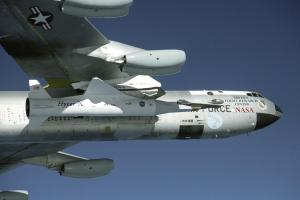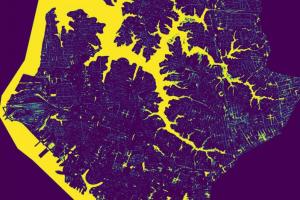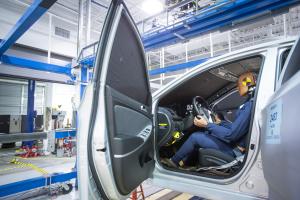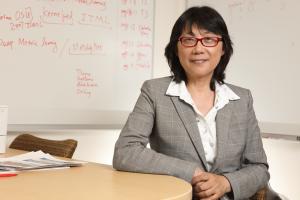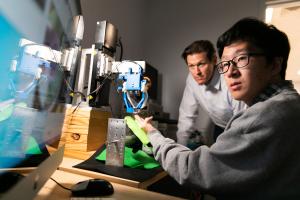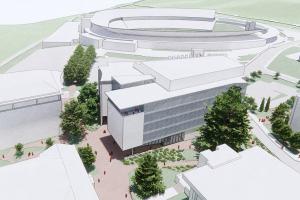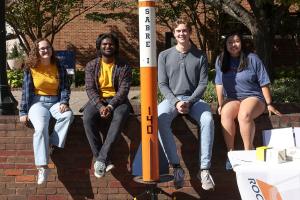Engineering for the Greater Good
Building a Brighter Future Through Research and Education
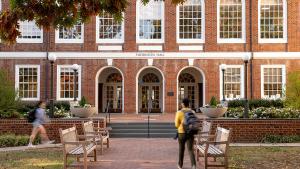
At UVA Engineering, our mission is to make the world a better place by putting people at the center of innovation. Our approach to engineering leadership is a uniquely UVA one, placing equal importance on being both great and good. Our faculty are pioneering researchers making groundbreaking discoveries in fields including artificial intelligence, hypersonics, cancer research and so much more. Our students excel in the classroom and through hands-on experiences that prepare them for impactful careers. The spirit of collaboration among our students and faculty not only drives innovation but creates a community of care, where collegiality, support, and engineering ethics thrive. We invite you to learn more about our research achievements, student successes, and future aspirations, including a transformational new building that will generate new discoveries and inspire the engineers of tomorrow. Together, we can build a brighter future through engineering for the greater good.
Dean Jennifer L. West, Ph.D., NAE, NAM, NAI
Saunders Family Professor of Engineering
UVA School of Engineering and Applied Science
Facts at a Glance
3115 Undergraduate Bachelor of Science students
846 Undergraduate Computer Science Bachelor of Arts
719 First-Year Students
119 Transfer Students
Winning at Indy with the CAVCAR
Computer Science professor Madhur Behl and the Cavalier Autonomous Racing Team recently showcased new high-speed, self-correcting AI algorithms through the performance of their autonomous racecar, CAVCAR, at the Indy Autonomous Challenge. The team achieved a record-breaking lap speed of 52.628 seconds, an average lap speed of 171 mph and a top speed of 184 mph. The team attributes their edge to a mathematical tweak in vehicle dynamics and a revised car-detection algorithm that learns from its mistakes. These innovations allowed the car to perform complex maneuvers, such as high-speed passing, with remarkable agility and control. The success of CAVCAR highlights the potential for advancements in AI and vehicle safety.
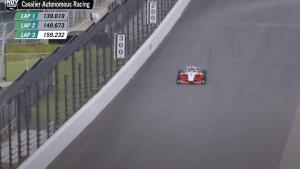
Watch the CAVCAR hit a record-breaking lap speed during the Indy Autonomous Challenge race in September 2024.
-
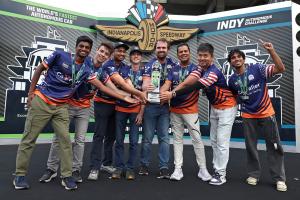
UVA's Robot Racer Zooms to Victory at Indy Speedway
UVA engineers think fast and so does the AI racecar they program, as evidenced by CAVCAR's triumph in the Indy Autonomous Challenge.
-
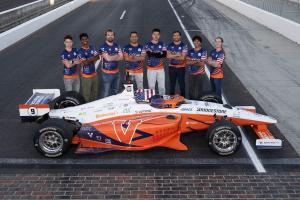
UVA and NCI-Funded SASCO Center Marks Milestones in Cancer Cell Organelles Research
UVA’s Center for Systems Analysis of Stress-adapted Cancer Organelles (SASCO) recently hosted its first annual symposium.
20 Years After ‘Hyper-X,’ UVA Team Makes NASA Hypersonic Breakthrough
Wind Tunnel Study Shows Hypersonic Jet Engine Flow Can Be Controlled Optically
Norfolk Flooding Predicted in Seconds With Machine Learning Models
UVA civil engineering professor Jon Goodall’s hydrological modeling expertise is helping to create tools for decision-makers coping with weather events.
Developing New Solutions to Deliver Cleaner Energy
Elizabeth J. Opila, professor and chair of the Department of Materials Science and Engineering, has developed new protective coatings that allow turbine engines to operate at higher temperatures, which can be utilized in everything from aircraft propulsion to power generation. The multidisciplinary team led by Opila used machine learning and computational methods to explore possible combinations of rare earth oxides that can be applied in a single layer, improving turbine efficiency and reducing fuel consumption and emissions. This innovation, funded by the U.S. Department of Energy’s ARPA-E ULTIMATE program, has significant implications for cleaner energy and lower operating costs.
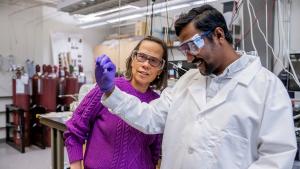
Researchers Drive Safety Forward on 3 Toyota Collaborative Projects
UVA Engineering researchers received funding from a Toyota initiative to study injury prediction and prevention in collisions.
Using Machine Learning for Better Human Understanding of Disease Risk Factors and Treatments
Machine learning changed health care by making sense of biological data, but for UVA Engineering’s Aidong Zhang, that’s only part of understanding disease risk and treatments.
Researchers Put Finger on Why Men and Women Feel Touch Differently
With new experimental techniques, University of Virginia engineers identified what gives us a great sense of touch, which could make modern technologies a touch better.
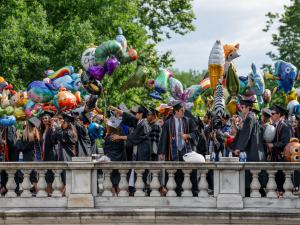
Celebrating the Class of 2025
The UVA Engineering Class of 2025 exemplified innovation, resilience and a commitment to engineering for the greater good throughout their academic journey, pushing boundaries and setting new standards for excellence.
Preparing Tomorrow's Leaders
The undergraduate program is student-centered, combining engineering expertise with leadership development, communication skills and a foundation in ethics.
The First-Year Engineering Center provides a two-semester Engineering Foundations course, providing students with a common foundation and helping them build strong relationships with faculty advisors.
Experiential learning opportunities provide hands-on skills while emphasizing teamwork. Students collaborate with world-class faculty on undergraduate research experiences, gain international perspective through J-term opportunities, and leverage skills in government and industry internships. Engineering clubs like the Hoos Cyber Defense Team and the UVA Rocketry Team provide leadership opportunities.
The new Engineering Character Strength Initiative will prepare students to be ethical engineering leaders.
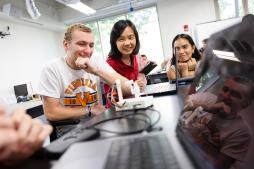
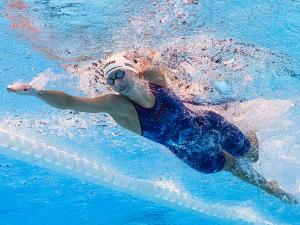
Contributing to the U.S. Swim Team’s Olympic Success
Engineering alumnus Jerry Lu used “digital twins” for data analysis, helping gold medalist (and fellow Wahoo) Kate Douglass and the U.S. swim team win medals and set records at the 2024 Summer Olympics in Paris.
Inspiring the Next Generation Through STEM Education and Advocacy
NASA astronaut, former NFL player and materials science and engineering alumnus Leland Melvin visited UVA Engineering’s Rice Hall for a screening of his National Geographic documentary, “The Space Race.” Melvin, who served as an executive producer, spoke to a standing-room-only crowd and shared his journey from the NFL to space and the challenges he overcame. He now focuses on encouraging young people to pursue careers in STEM fields and advocating for educational opportunities. UVA Engineering alumni like Melvin often find opportunities to return to Grounds to connect with current students.
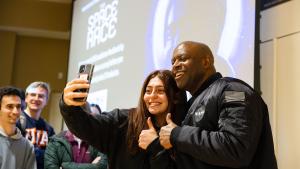
Translating Research Into Real-World Solutions
Many faculty translate their research into entrepreneurial ventures. Biomedical engineering professor Silvia Salinas Blemker, co-founder of Springbok Analytics, received FDA clearance for MuscleView™, an AI-based diagnostic tool that analyzes MRI data to assess muscle health. This non-invasive technology creates 3D visualizations of muscle health and automates MRI analysis — a previously tedious and manual process. The FDA’s 510(j) clearance allows Springbok to make precision medicine available in sports medicine, orthopedics and therapeutic applications.
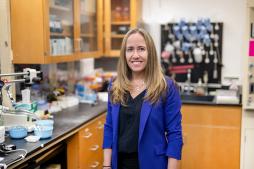
In addition to faculty, students also embrace entrepreneurship opportunities.
-
Student Entrepreneurs
Students Mohammed Muslim, Arnav Wadehra and Jeremy Suh are participating in the Y Combinator incubator with their software start-up.
-
VentureForward
The VentureForward program provides microgrants to help students pursue their innovative ideas.
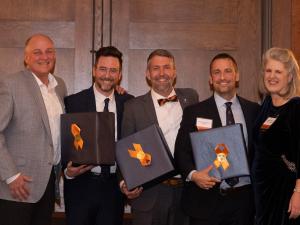
Achievement Award Recipients Honored at Thornton Society Dinner
Each year, the University of Virginia’s School of Engineering and Applied Science presents Achievement Awards to the most distinguished members of its community – engineering alumni, faculty, staff, students and supporters who have made significant contributions to the school, the community or the professional world.
Student Experiences
-
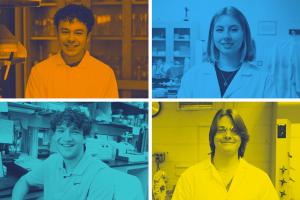
Dean’s Fellows Experience Summer of Discovery
Here’s what four of 38 UVA Engineering undergraduate students doing research in labs across several departments have been up to this summer as Dean’s Fellows.
-
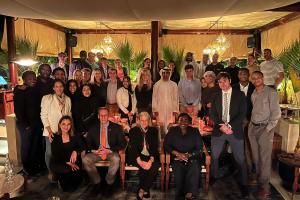
Immersing in Dubai’s Technological and Cultural Innovations
UVA engineering students gained intercultural and professional skills in Dubai through hands-on projects, corporate interactions and cultural experiences, preparing them for global careers.
UVA Engineering Shines With Top University Awards
Three faculty, Brian Helmke, Natasha Smith and Garrick Louis, and graduate student Zackary Landsman were named among UVA’s best for teaching and public service.
UVA Students Help Virginia Defend Against Election Cyberattacks
UVA computer science interns are among army of “Cyber Navigators” helping local election offices in Virginia find and address potential vulnerabilities that could undermine public trust.
Nanoparticle Therapy Offers New Hope for Prostate Cancer Patients
A study conducted by researchers from the University of Virginia, Mount Sinai, the University of Michigan, the University of Texas and others, has demonstrated the clinical success of a new nanoparticle-based, laser-guided therapy for prostate cancer treatment.
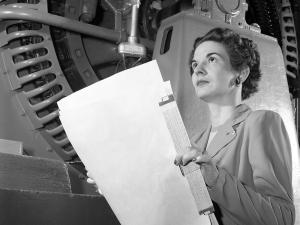
Honoring the Past, Inspiring the Future
Kitty O'Brien Joyner was the first woman to graduate from UVA's engineering program, earning a Bachelor of Science degree in 1939. A Charlottesville native, she successfully petitioned to attend UVA’s all-male engineering school after two years at Sweet Briar College. Joyner became the first female engineer at the National Advisory Committee for Aeronautics, the predecessor of NASA Langley Research Center, where she managed supersonic wind tunnels and became a NASA Branch Head. Her legacy continues today at UVA Engineering, where female students now make up 33% of enrollment – surpassing the national average by more than ten points – and organizations like the Society of Women Engineers and Girls Who Code follow in her footsteps.
Elevating UVA Engineering
To fulfill its mission of making the world a better place, UVA Engineering needs to provide its students and faculty with the tools and resources to build a brighter future through research and education. As part of UVA’s Honor the Future Campaign, UVA Engineering has identified four core philanthropic priorities: student enrichment and experiential learning, programs and people, research and impact, and a new building to support enrollment and research growth.
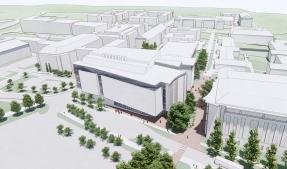
The Whitehead Road Building Project aims to create a state-of-the-art engineering facility with modern classrooms, collaborative spaces and advanced laboratories. This new building will be a hub for innovation, research and learning, reflecting UVA Engineering’s commitment to excellence and growth. Students will benefit from enhanced learning environments and hands-on experiences, while faculty will have access to leading-edge resources and collaborative spaces to advance their research. The 230,000-square-foot trans-disciplinary academic and research building will be located at the entrance of Engineer’s Way, bringing together the University and all engineering departments to collaborate on research focused on AI, biomaterials, energy and the environment. This project will have a lasting impact on the University, the Commonwealth of Virginia and society as a whole, embodying the spirit of engineering for the greater good.

